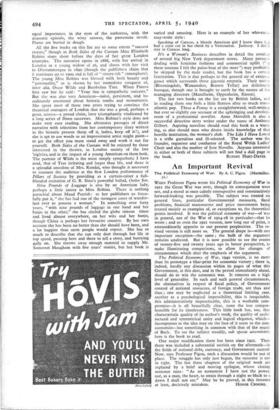An Important Revival
The Political Economy of War. By A. C. Pigou. (Macmillan. is.)
WHEN Professor Pigou wrote his Political Economy of War in 1921 the Great War was over, though its consequences were not, and a mood at once calmly retrospective and constructively forward-looking was possible. The subject was treated on general lines, particular Governmental measures, fiscal problems, financial manoeuvres and price movements being treated mainly as examples of, or exceptions to, the theoretical points involved. It was the political economy of war—of war in general, not of the War of 1914-18 in particular—that he wrote ; and so even the 1921 version, now long out of print, is extraordinarily apposite to our present perplexities. The re- vised version is still more so, The general shape is—with one important exception—the same ; the bulk of the argument remains unaltered. But it is now possible to see the events of twenty-five and twenty years ago in better perspective, to make illuminating comparisons, to allow for changes of circumstance which alter the emphasis of the argument.
The Political Economy of War, 04o version, is no more than its prototype a blue-print for economic victory ; there is, indeed, hardly any discussion within its pages of what this Government, at this date, and in the period immediately ahead, should do to win the economic war. It remains on a high level of generality. In such and such general circumstances, the alternatives in respect of fiscal policy, of Government control of national resources, of foreign trade, are thus and thus ; one may be neglected as a theoretical limiting case, another as a psychological impossibility, this is inequitable, this administratively impracticable, this is a workable com- promise—it is all beautifully clear, none the less compre- hensible for its timelessness. This little book has, too, that characteristic quality of its author's work, the quality of archi- tectural and symmetrical unity and logical elegance, which— incongruous as the idea may on the face of it seem to the non- economist—has something in common with that of the music of Bach. To see the subject steadily, sub specie aeternitatis, here is the book to read.
One major modification there has been since 1921. Then there was included a substantial section on the aftermath—in the fields of national debt, currency, and Government control. Now, says Professor Pigou, such a discussion would be out of place. The struggle has only just begun, the outcome is not in sight. The last three chapters of the original work are replaced by a brief and moving epilogue, whose closing sentence runs : " As an economist I have not the power, nor, as a man, the heart, to strain through a night so black to a dawn I shall not see." May he be proved, in this instance














































 Previous page
Previous page